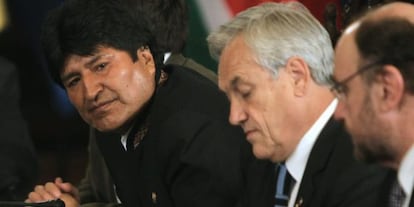Bolivia takes Chile to The Hague over sea access
Evo Morales’ government promises to accept court’s ruling as final


Bolivia has filed a complaint against its neighbor Chile with the International Court of Justice in The Hague over its longstanding demand to gain direct land access to the Pacific Ocean.
The government in La Paz estimates that it lost 400 kilometers of coastline and 129,000 square kilometers of land after the War of the Pacific (1879-1883), when Bolivian forces battled the Chilean army.
But the government of Santiago says that there is nothing more to settle after both sides signed the Treaty of Peace and Friendship in 1904. Chilean lawyers will argue before the court at The Hague that Bolivia’s case has no legal backing.
The International Court of Justice was created in 1945 to resolve disputes between nations.
In the complaint, Bolivia has stated “its commitment” to comply with the final resolution, whatever the decision may be. In order for the government’s case to prosper, Bolivia must not only submit legal arguments but also demonstrate the numerous attempts it has tried over the years to resolve the dispute — without the use of violence or force — with the Chilean government. This is a mandatory requisite under the court’s statutes.
In 1948, both countries ratified the so-called Bogota Pact in which they recognized the court’s jurisdiction — another condition that must be met by both sides so that the case can be admitted.
The court will set the rules for hearings on the case, including admitting third countries who could be called to testify before the panel of international judges.
Nationalistic cause
The case is an important one for the government of President Evo Morales, who has portrayed it as a nationalistic cause. Morales had assured Bolivians that he would take the fight to The Hague “because with the efforts and backing of our united people, we will demonstrate to the world our right to have access to the sea.” Bolivia has reportedly spent great deals of money in preparing its case, hiring the nation’s best lawyers as well as international legal experts.
Two years ago Bolivian Foreign Minister David Choquehuanca tried to present the case before the Organization of American States (OAS) after describing the dispute as an “hemispheric issue.” But OAS Secretary General José Miguel Insulza, who is from Chile, rejected the case by saying it was a bilateral dispute.
Tu suscripción se está usando en otro dispositivo
¿Quieres añadir otro usuario a tu suscripción?
Si continúas leyendo en este dispositivo, no se podrá leer en el otro.
FlechaTu suscripción se está usando en otro dispositivo y solo puedes acceder a EL PAÍS desde un dispositivo a la vez.
Si quieres compartir tu cuenta, cambia tu suscripción a la modalidad Premium, así podrás añadir otro usuario. Cada uno accederá con su propia cuenta de email, lo que os permitirá personalizar vuestra experiencia en EL PAÍS.
¿Tienes una suscripción de empresa? Accede aquí para contratar más cuentas.
En el caso de no saber quién está usando tu cuenta, te recomendamos cambiar tu contraseña aquí.
Si decides continuar compartiendo tu cuenta, este mensaje se mostrará en tu dispositivo y en el de la otra persona que está usando tu cuenta de forma indefinida, afectando a tu experiencia de lectura. Puedes consultar aquí los términos y condiciones de la suscripción digital.








































